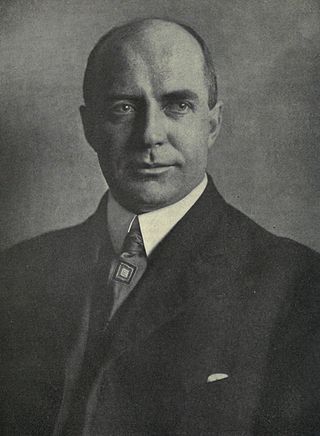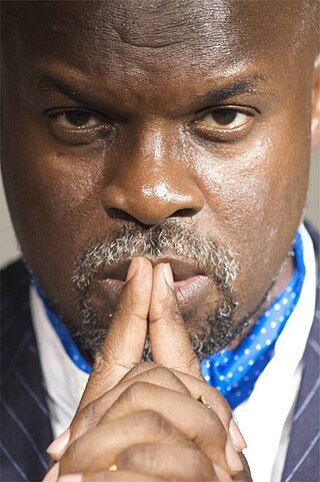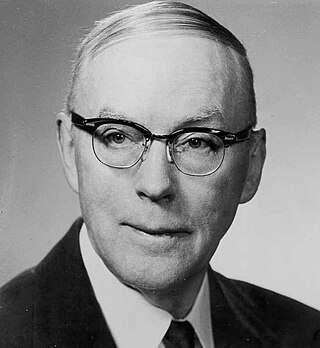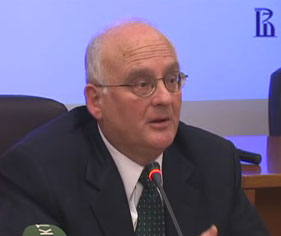Related Research Articles
William Julius Wilson is an American sociologist, a professor at Harvard University, and an author of works on urban sociology, race, and class issues. Laureate of the National Medal of Science, he served as the 80th President of the American Sociological Association, was a member of numerous national boards and commissions. He identified the importance of neighborhood effects and demonstrated how limited employment opportunities and weakened institutional resources exacerbated poverty within American inner-city neighborhoods.

Robert Ezra Park was an American urban sociologist who is considered to be one of the most influential figures in early U.S. sociology. Park was a pioneer in the field of sociology, changing it from a passive philosophical discipline to an active discipline rooted in the study of human behavior. He made significant contributions to the study of urban communities, race relations and the development of empirically grounded research methods, most notably participant observation in the field of criminology. From 1905 to 1914, Park worked with Booker T. Washington at the Tuskegee Institute. After Tuskegee, he taught at the University of Chicago from 1914 to 1933, where he played a leading role in the development of the Chicago School of sociology.

William Isaac Thomas was an American sociologist, understood today as a key figure behind the theory of symbolic interactionism.

Seymour Martin Lipset was an American sociologist and political scientist. His major work was in the fields of political sociology, trade union organization, social stratification, public opinion, and the sociology of intellectual life. He also wrote extensively about the conditions for democracy in comparative perspective. He was president of both the American Political Science Association (1979–1980) and the American Sociological Association (1992–1993). A socialist in his early life, Lipset later moved to the right, and was considered to be one of the first neoconservatives.
Gary Alan Fine is an American sociologist and author.

Tukufu Zuberi is an American sociologist, filmmaker, social critic, educator, and writer. Zuberi has appeared in several documentaries on Africa and the African diaspora, including Liberia: America's Stepchild (2002), and 500 Years Later (2005). He is one of the hosts of the long-running PBS program History Detectives. As founder of his own production company, he produced the film African Independence, which premiered at the San Diego Black Film Festival in January 2013. He is the Lasry Family Professor of Race Relations, professor and chair of the sociology department, and professor of Africana studies at the University of Pennsylvania.
The University of Chicago Divinity School is a private graduate institution at the University of Chicago dedicated to the training of academics and clergy across religious boundaries. Formed under Baptist auspices, the school today lacks any sectarian affiliations.

Joshua Fishman was an American linguist who specialized in the sociology of language, language planning, bilingual education, and language and ethnicity.
Mayer Nathan Zald was an American sociologist. He was a professor of sociology, social work and business administration at the University of Michigan, noted for contributions to the sociology of organizations and social movements.
Richard C. Anderson is an American educational psychologist who has published influential research on children's reading, vocabulary growth, and story discussions that promote thinking. He is the director of the Center for the Study of Reading and professor emeritus at the University of Illinois at Urbana-Champaign. Anderson is a past president of the American Educational Research Association.
Everett Cherrington Hughes was an American sociologist best known for his work on ethnic relations, work and occupations and the methodology of fieldwork. His take on sociology was, however, very broad. In recent scholarship, his theoretical contribution to sociology has been discussed as interpretive institutional ecology, forming a theoretical frame of reference that combines elements of the classical ecological theory of class, and elements of a proto-dependency analysis of Quebec's industrialization in the 1930s.
Irving Louis Horowitz was an American sociologist, author, and college professor who wrote and lectured extensively in his field, and his later years came to fear that it risked being seized by left-wing ideologues. He proposed a quantitative index for measuring a country's quality of life, and helped to popularize "Third World" as a term for the poorer nations of the Non-Aligned Movement. He was considered by many to be a neoconservative, although he maintained that he had no political adherence.
Evelyn Seiko Nakano Glenn is a professor at the University of California, Berkeley. In addition to her teaching and research responsibilities, she served as founding director of the university's Center for Race and Gender (CRG), a leading U.S. academic center for the study of intersectionality among gender, race and class social groups and institutions. In June 2008, Glenn was elected president of the 15,000-member American Sociological Association. She served as president-elect during the 2008–2009 academic year, assumed her presidency at the annual ASA national convention in San Francisco in August 2009, served as president of the association during the 2009–2010 year, and continued to serve on the ASA governing council as past-president until August 2011. Her presidential address, given at the 2010 meetings in Atlanta, was entitled "Constructing Citizenship: Exclusion, Subordination, and Resistance", and was printed as the lead article in the American Sociological Review.

George Andrew Lundberg was an American sociologist.

Philip G. Altbach is an American author, researcher and former professor at Boston College, and the founding director of the Boston College Center for International Higher Education.
Albert James Bergesen is an American sociologist and Professor and Head of the Department of Sociology at University of Arizona. He is also a Professor of Government and Public Policy, and Professor of Sociology in the McGuire Center for Entrepreneurship, at the Eller College of Management. He has published three books, edited five anthologies, authored hundreds of articles, and is cited in numerous fields, such as collective violence, international relations, world-systems analysis, environmental sociology, cultural sociology and organizational sociology.
William Stephen Howard is an American sociologist. His studies and work focus upon social change in Africa and social movements within the Muslim world. He has written about his experiences with the Muslim community in Sudan. Howard is a professor and an associate director of graduate studies at Ohio University. He works within the School for Media Arts and Studies in the Scripps College of Communications.
Reuben Lorenzo Hill Jr. was an American sociologist. He specialized in the sociology of the family. He was the seventh president of the International Sociological Association (1970–1974). He has been called "the founding father of family sociology".
References
- 1 2 "The University of Chicago Library - The University of Chicago Library". www.lib.uchicago.edu. Retrieved 2023-10-31.
- ↑ Foster, Philip (1991). "C. Arnold Anderson: A Personal Memoir". Comparative Education Review. 35 (2): 215–221. ISSN 0010-4086.
- ↑ "Comparative Education - an overview | ScienceDirect Topics". www.sciencedirect.com. Retrieved 2023-10-31.
- ↑ Epstein, Erwin H. (2019-07-01). North American Scholars of Comparative Education: Examining the Work and Influence of Notable 20th Century Comparativists. Routledge. ISBN 978-1-000-02060-1.